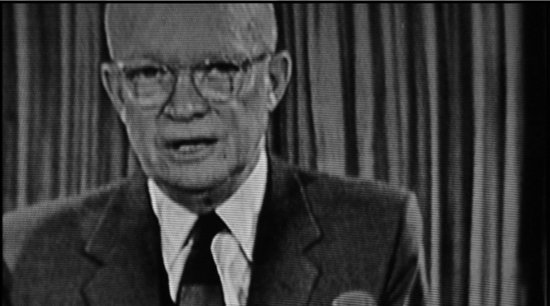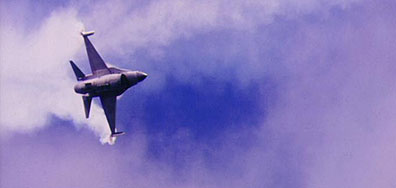“The bigger problem is that U.S. funding will discredit the very people we seek to encourage. Many Iranians, perhaps even a majority, despise their rulers. They yearn for democracy. To a degree unmatched in any other Middle Eastern nation besides Israel, they even like the United States. However, as anyone who knows anything about Iran’s history would emphasize, these same Iranians deeply distrust outsiders — including American ones — who try to interfere in their domestic affairs…By openly calling for regime change and backing it up with money (however trifling a sum), the Bush administration is playing into Ahmadinejad’s hands.” Slate‘s Fred Kaplan assesses the Dubya administration’s new Iran strategy, and finds that they’re repeating the same amateurish tone-deafness that helped propel Ahmadinejad into office in the first place. (Perhaps Dubya might get it if someone reminded him of the Guardian‘s experiment in Ohio in 2004.)
Category: Dubya Diplomacy
Altered State.
“‘The suspicion is we would undermine the policy,’ said one of the officials who have felt sidelined. ‘That is what all of us find most offensive. We are here to serve any administration.'” Career State Department officials tell of a punitive “reorganization” by Dubya political appointees to “punish long-term employees whose views they considered suspect“…and to close a back door channel that once bypassed ideological wingnut John Bolton. “About a dozen top experts on nonproliferation have left the department in recent months, with many citing the reorganization as a reason.”
Gitmo Begone.
“We’ve always said that Guantanamo Bay was something that shouldn’t have happened.” A report by the UN Human Rights Commission argues that the US should shut down the Gitmo gulag immediately, a conclusion shared by Kofi Annan and — apparently — the British government. As to be expected from this gang, the White House is shrugging the criticism off.
SOTU ’06.
A quick note on Tuesday’s State of the Union: I actually think Dubya has delivered some well-crafted speeches (1/23) in the past, even if I disagree with almost all of their content. This wasn’t one of them. Except for the “America is addicted to oil” line (which Jimmy Carter basically said over 25 years ago) and the “human-animal hybrid” goofiness (which, as Crooked Timber points out, might mean trouble for diabetics), there wasn’t a single memorable moment throughout, just more of the same “9/11” and “freedom, yeah” grandstanding. (And Kaine was no better — I like to think I’m more interested in politics than most people, and I was bored stiff after a minute or two. Nice fireplace, tho’.) If the White House was looking for this address to reverse their ailing fortunes, a la Clinton in ’98, my guess is that they failed. (Pharyngula link via Now This.)
Fight Club.
“In the councils of government, we must guard against the acquisition of unwarranted influence, whether sought or unsought, by the military-industrial complex. The potential for the disastrous rise of misplaced power exists and will persist. We must never let the weight of this combination endanger our liberties or democratic processes.” That flaming liberal Dwight Eisenhower’s somber farewell address to the nation is the historical and thematic anchor for Eugene Jarecki’s documentary Why We Fight, a sobering disquisition on American militarism and foreign policy since 9/11. In essence, Why We Fight is the movie Fahrenheit 9/11 should have been. Like F911, this film preaches to the choir, but it also makes a more substantive critique of Dubya diplomacy and the 9/11-Iraq switcheroo, with much less of the grandstanding that marred Moore’s earlier documentary (and drove right-wing audiences berzerk.)
Sadly, the basic tale here is all-too-familiar by now. Ensconced in Dubya’s administration from the word go, the right-wing think-tank crowd (Wolfowitz, Perle, Kristol, etc.) used the tragedy of 9/11 as a pretext to enact all their neocon fantasies (spelled out in this 2000 Project for a New American Century report), beginning in Iraq. Taken into consideration with Cheney the Military-Contractor-in-Chief doling out fat deals to his Halliburton-KBR cronies from the Vice-President’s office, and members of Congress meekly signing off on every military funding bill that comes down the pike (partly because, as the film points out, weapons systems such as the B-1 or F-22 have a part built in every state), it seems uncomfortably clear that President Eisenhower’s grim vision has come to pass.
To help him rake this muck, Jarecki shrewdly gives face-time not only to learned critics of recent foreign-policy — CIA vet Chalmers Johnson, Gore Vidal (looking unwell) — but also to the neocons themselves. Richard Perle is here, saying (as always) insufferably self-serving things, and Bill Kristol glows like a kid in a candy store when he gets to talk up his role in fostering Dubya diplomacy. (Karen Kwiatkowski, a career military woman who watched the neocon coup unfold within the corridors of the Pentagon, also delivers some keen insights.) And, when discussing the corruption that festers in the heart of our Capitol, Jarecki brings out not only Charles Lewis of the Center for Public Integrity but that flickering mirage of independent-minded Republicanism, John McCain. (In fact, Jarecki encapsulates the frustrating problem with McCain in one small moment: Right after admitting to the camera that Cheney’s no-bid KBR deals “look bad”, the Senator happens to get a call from the Vice-President. In his speak-of-the-devil grimace of bemused worry, you can see him mentally falling into line behind the administration, as always.)
To be sure, Why We Fight has some problems. There’s a central tension in the film between the argument that Team Dubya is a corrupt administration of historical proportions and the notion that every president since Kennedy has been party to an increasingly corrupt system, and it’s never really resolved satisfactorily here. Jarecki wants you to think that this documentary is about the rise of the Imperial Presidency across five decades, but, some lip service to Tonkin notwithstanding, the argument here is grounded almost totally in the Age of Dubya. (I don’t think it’s a bad thing, necessarily, but it is the case.) And, sometimes the critique seems a little scattershot — Jarecki seems to fault the Pentagon both for KBR’s no-bid contracts and, when we see Lockheed and McDonnell-Douglas salesmen going head-to-head, for bidding on contracts. (Still, his larger point is valid — As Chalmers Johnson puts it, “When war becomes that profitable, you’re going to see more of it.“)
Also, the film loses focus at times and meanders along tangents — such as the remembrances of two Stealth Fighter pilots on the First Shot Fired in the Iraq war, or the glum story of an army recruit in Manhattan looking to turn his life around. This latter tale, along with the story of Wilton Sekzer, a retired Vietnam Vet and NYPD sergeant who lost his son on 9/11 and wants somebody to pay, are handled with more grace and less showmanship than similar vignettes in Michael Moore’s film, but they’re in the same ballpark. (As an aside, I was also somewhat irked by shots of NASA thrown in with the many images of missile tests and ordnance factories. Ok, both involve rockets, research, and billions of dollars, but space exploration and war are different enough goals that such a comparison merits more unpacking.)
Nevertheless, Why We Fight is well worth-seeing, and hopefully, this film will make it out to the multiplexes. If nothing else, it’ll do this country good to ponder anew both a president’s warning about the “disastrous rise of misplaced power,” and a vice-president’s assurance that we’ll be “greeted as liberators.”
Nuclear Chess, or Nuclear Chicken?
“So, here’s the big question: If diplomacy is the only rational solution to this problem yet the Iranians just want nukes — in other words, if there is no deal (or at least no deal that the United States would realistically offer) that would compel them to give up their dream — what’s the next step?” Slate‘s Fred Kaplan admits to being stymied on the troubling question of Iranian nukes.
Tehran Twaddle.
“The West has given more significance to the myth of the genocide of the Jews, even more significant than God, religion, and the prophets.” In the world-gets-even-scarier-department, Iran’s hardliner president publicly indulges in Holocaust denial. Clearly, Iran is living up to its axis-of-evil appellation these days, but remember: Ahmadinejad’s election was in part blowback from Dubya’s amateurish and tone-deaf Middle-East policy in the first place. At any rate, it’s clear that our Iran situation is worsening, and that Iranian possession of nukes could be a very frightening scenario.
Mea Culpa, Sort-of.
“It is true that much of the intelligence turned out to be wrong. As president I am responsible for the decision to go into Iraq.” In his final speech on Iraq before tomorrow’s elections, (text) Dubya admits the case for war was FUBAR, while insisting it was a good idea anyway. (“The United States did not choose war — the choice was Saddam Hussein’s.“) Of course, Bush neglected to mention that it was he, Cheney, Rumsfeld, et al who cherry-picked through the available intelligence and continued to recite claims they knew to be false. Still, for someone who’s seems pathologically incapable of accepting reality at times, this has to be considered a step forward.
Greenhouse Doghouse.
Shunned by Dubya and spurred on by Bill Clinton, the rest of the world comes together to limit greenhouse gases and extend the Kyoto treaty. “Brushing aside the Bush administration’s fierce protests, all the industrialized nations except the United States and Australia were near an agreement Friday night to embark on a new round of formal talks aimed at setting new mandatory limits on greenhouse gas emissions after 2012, when the existing pact known as the Kyoto Protocol expires.“
Iran, Iran so far away.
“The Arab states agree on one thing: Iran is emerging as the big winner of the American invasion, and both President Bush’s new strategy and the Democratic responses to it dangerously miss the point…[T]he Shiite clerics in Iraq have achieved fundamental political goals: capturing oil revenues, strengthening the role of Islam in the state, and building up formidable militias that will defend their gains and advance their causes as the Americans draw down and leave. Iraq’s neighbors, then, see it evolving into a Shiite-dominated, Iranian buffer state that will strengthen Tehran’s power in the Persian Gulf just as it is seeks nuclear weapons and intensifies its rhetoric against Israel.”
By way of Dangerous Meta, former Dem candidate Wesley Clark argues for a revised strategy in Iraq, one centered on border control, the reduction of Iranian influence in the region, and the use of carrots rather than sticks to defang insurgents.



